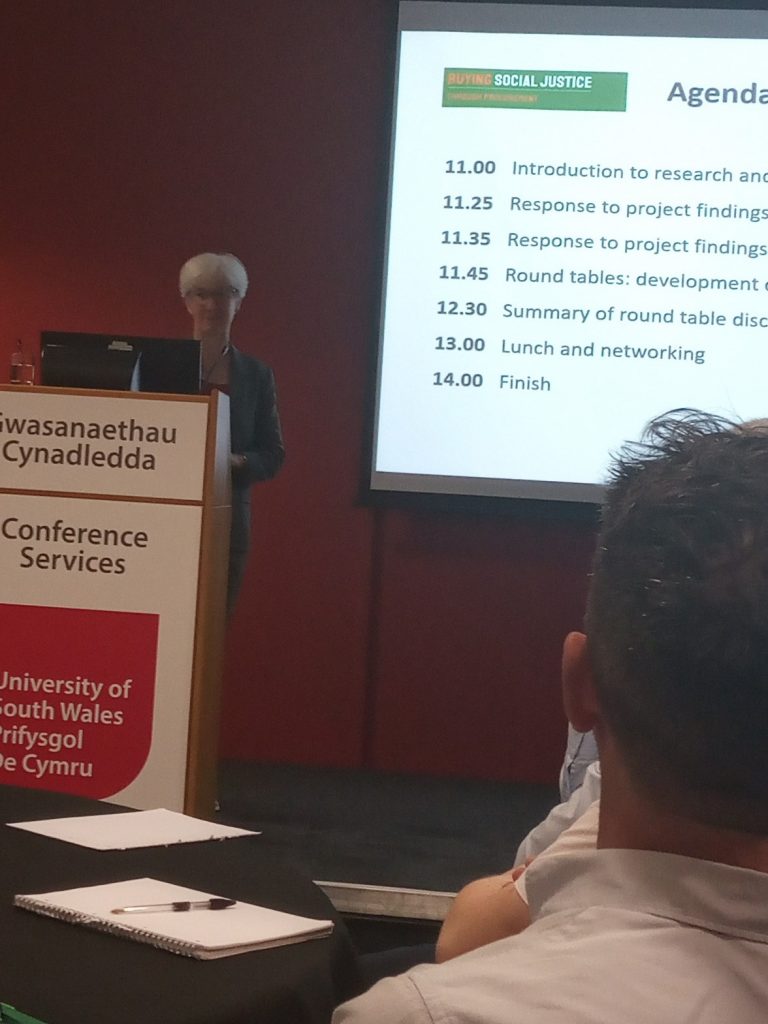Strong legislative framework for social procurement in Wales welcomed, but further resources needed
The Buying Social Justice project discussed its research findings with public sector procurement experts in Wales at a well-attended workshop on 25 May. More than 20 practitioners from across the Welsh public sector attended the workshop, held at the University of South Wales, on the day after the Social Partnership and Public Procurement (Wales) Act was passed into law. The Act aims to improve the well-being of the Welsh population by improving public services through social partnership working, promoting fair work and socially-responsible public procurement.
Project researcher Professor Hazel Conley welcomed the range of policies introduced by the Welsh Government to promote socially-responsible public procurement as a means to improve well-being, encourage fair work, reduce socio-economic inequality and tackle racism. She pointed out that the emphasis on addressing socio-economic inequality needed to be accompanied by equal attention to protected equality strands such as gender and race to ensure well-being and fairness.
Dr Katharina Sarter presented findings of our survey of procurement officers across the public sector in England, Scotland and Wales, highlighting that equality questions are commonly used in pre-qualification stages of procurement, but the inclusion of equality requirements was more likely among organisations that felt themselves to be more mature in their procurement practice. The survey identified that mature organisations found that sharing knowledge and practice among organisations was beneficial. Monitoring of social and equality commitments was an area for improvement in many organisations.
Lack of resources – time, money and expertise – emerged from our expert interviews as a key barrier to the effective incorporation of social and equality objectives in procurement. However, Dr Joyce Mamode identified that collaboration and networking, both within and between organisations, was an enabler of the sharing of good practice. In summarising the evidence of good practice identified so far in the research, Professor Tessa Wright emphasised the importance of good engagement with suppliers during tendering and contract management, equality, diversity and inclusion accreditation and training, and comprehensive monitoring and reporting systems.
Commenting on the research findings, Natasha Davies of the gender equality organisation Chwarae Teg, highlighted the implementation gap between the strong policy commitment of the Welsh Government and procurement practice. She stressed the need to include equality objectives at a strategic level, not just as add-on. She said: “now that we have a strong legislative framework in place, we need to focus on outcome and impact to ensure real progress.”
Further comments were provided by housing consultant Keith Edwards who stressed the need for a three C’s approach, taking account of the client, contractor and community – noting that the articulation of what the community wants from public spending is a very good starting point for identifying needs, particularly in relation to equality, diversity and inclusion.
Lively discussions of the findings took place at round tables, which provides valuable insights for the development of recommendations and guidance from the project.
Two further workshops, aimed at procurement officers, equality and diversity practitioners, policy makers and trade unions and civil society organisations are being held in Birmingham on 5 June and Edinburgh on 22 June.



